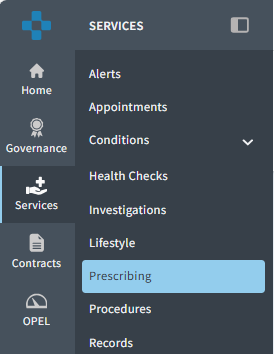TABLE OF CONTENTS
- Introduction
- Accessing the Prescribing Dashboard
- Navigating the Prescribing Dashboard
- Practical Tips for Cost-Effective Prescribing
Introduction
Managing medicines well in general practice is not just about making sure patients get the right treatment—it is also about making the most of NHS resources. With growing pressure on healthcare budgets, it is important that the medicines prescribed are not only effective but also offer good value for money. Keeping an eye on cost-effectiveness helps practices reduce waste, improve patient outcomes, and stay in line with national guidance, all while supporting a more sustainable health service.
Accessing the Prescribing Dashboard
Select the Services icon and click on Prescribing.

Click on the Cost-Effectiveness tab.

Navigating the Prescribing Dashboard
The reports are split into two categories:
- Cost Saving - General
- Cost Saving - OTC
To view just one of these two categories at any one time, you can filter the dashboard using the filter icon. Select your activity type as one of the categories and click Apply.

Practical Tips for Cost-Effective Prescribing
From the insights gained from the dashboard, you may wish to consider the following:
- Track and analyse prescribing patterns and trends: Regularly monitor and evaluate the prescribing habits within your practice to identify areas for improvement. This can help in recognising patterns that may lead to unnecessary expenses and adjusting practices to enhance cost-effectiveness.
- Promote generic prescribing: Encourage the use of generic medications, which are typically more affordable than brand-name drugs. This will help to minimise the additional workload of making bulk switches to more cost-effective alternatives.
- Conduct medication reviews: Regularly assess patients' medication regimens to ensure they are necessary, effective, and safe. This can help in identifying any redundant or inappropriate medications, allowing for adjustments that can reduce costs and improve patient outcomes.
- Regularly review repeat prescriptions: Evaluate repeat prescriptions to eliminate unnecessary or duplicate medications and adjust dosages based on the patient's current needs. This ensures that patients receive only what is necessary, reducing waste and costs.
- Prevent stockpiling and reduce waste: Implement strategies to prevent patients from accumulating excess medications, which can lead to waste. Encourage patients to order only what they need and educate them on proper medication disposal methods.
- Adhere to NICE guidelines and formulary recommendations: Follow the National Institute for Health and Care Excellence (NICE) guidelines and national (or local, if they vary) formulary recommendations to ensure that prescribing practices are evidence-based and cost-effective. This alignment helps in maintaining high-quality care while managing costs.
- Educate patients to improve adherence and reduce waste: Provide patients with information and resources to help them understand the importance of taking their medications as prescribed. This can enhance adherence, minimise waste, and ultimately lead to better health outcomes and cost savings.
- Educate and involve patients: Engage patients in discussions about their medications to help them understand why certain medications may be stopped or changed. Educate them on the importance of adherence and safe disposal practices, fostering a collaborative approach to managing their health.
If you require any further assistance on the process above, please contact the Ardens Manager Support Team on: support-manager@ardens.org.uk
